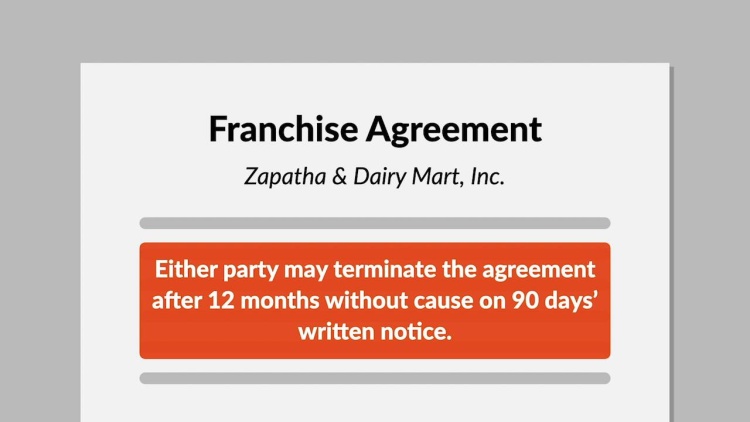Zapatha v. Dairy Mart, Inc.
Supreme Judicial Court of Massachusetts
408 N.E.2d 1370, 381 Mass. 284 (1980)
- Written by Megan Petersen, JD
Facts
Zapatha (plaintiff) is a former foreman and operations manager of an electroplating company. In May 1973, after almost twenty years of service, Zapatha was terminated from his position. Zapatha explored owning his own business, and spoke to Dairy Mart, Inc. (Dairy Mart) (defendant) about opportunities to franchise. On November 8, 1973, Dairy Mart approved Zapatha's franchise ownership and presented him with a franchise agreement. The agreement contained a termination clause providing that after twelve months, either Zapatha or Dairy Mart could terminate by providing ninety days’ written notice. The agreement also provided that if Dairy Mart terminated the agreement without cause, it would be required to purchase all of the Zapatha’s remaining inventory at eighty percent of market value. Dairy Mart ensured Zapatha read and understood all terms in the franchise agreement, and advised him to have it looked over by a lawyer. Zapatha did not consult a lawyer, and signed the franchise agreement containing the termination clause. In November 1977, Dairy Mart presented Zapatha with a new and more detailed franchise agreement. Some of the terms of the new agreement were less favorable for Zapatha, but others were possibly more favorable. Zapatha informed Dairy Mart that he would not sign a new agreement. On January 20, 1978, Dairy Mart gave written notice to Zapatha that it was terminating their franchise agreement within ninety days. Dairy Mart agreed to purchase all Zapatha’s remaining inventory at eighty percent of market value. Zapatha brought suit against Dairy Mart in Massachusetts state court, alleging the termination clause in the franchise agreement was unconscionable and that Dairy Mart’s conduct was unfair and deceptive. The trial court held for Zapatha. Dairy Mart appealed.
Rule of Law
Issue
Holding and Reasoning (Wilkins, J.)
What to do next…
Here's why 907,000 law students have relied on our case briefs:
- Written by law professors and practitioners, not other law students. 47,100 briefs, keyed to 996 casebooks. Top-notch customer support.
- The right amount of information, includes the facts, issues, rule of law, holding and reasoning, and any concurrences and dissents.
- Access in your classes, works on your mobile and tablet. Massive library of related video lessons and high quality multiple-choice questions.
- Easy to use, uniform format for every case brief. Written in plain English, not in legalese. Our briefs summarize and simplify; they don’t just repeat the court’s language.





